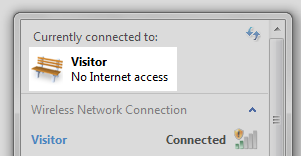Question of the Week
Windows 7 Network Awareness: How Windows knows it has an internet connection
Have you ever been connecting to a new wireless network and seen the following pop-up balloon?

 Whenever I connect to a WiFi network which requires in-browser authentication, such as university networks and hotel access points, Windows somehow magically knows. Windows also knows when your internet connection isn’t working, and can differentiate between having local LAN access, no network access at all, or full internet access. But how?
Whenever I connect to a WiFi network which requires in-browser authentication, such as university networks and hotel access points, Windows somehow magically knows. Windows also knows when your internet connection isn’t working, and can differentiate between having local LAN access, no network access at all, or full internet access. But how?
This week’s question of the week is one I myself asked about this very topic. I guessed that there must be some online Microsoft site that Windows is checking to determine the state of the connection, but I wanted proof, not just speculation.
VirtualBox and Networking – How you do it.
I have often had to answer questions on setting up advanced networking with VirtualBox. The most common ones are along the lines of:
Connecting to a VirtualBox machine from the host, using an ip address
and others of a similar ilk.
Well, let’s delve into the mysteries of VirtualBox’s networking (and networking in general) to unravel the secrets behind setting it all up right.
VirtualBox has 4 basic types of network available:
Three ways to alias your way to upvotes!
At Super User we were recently asked the question
Any shortcut for “cd ..” ?
Is there any shortcut for “cd ..”?
Well, I answered it, thinking it was just another run-of-the-mill quick questions and answers that we get many of every day. Little did I know, but things were going to take a turn in a slightly surreal direction… My answer, for some unfathomable reason, got an insane amount of upvotes. 50 to be precise, and still counting, and I am not exactly sure why.
What is “Flashing the BIOS”?
From time to time in the technology blogosphere and on Super User, I would hear the term “flashing the BIOS”. I always wondered what that meant, because I have been in and used the BIOS many times, and thought I knew most everything about it. So I decided to post a question on Super User, so I could understand exactly what flashing the BIOS means. I also asked what the benefits there are to flashing and whether or not it should be done from inside or outside of the operating system.
What is the BIOS?
User ongle said:
There is a chip in your computer that has bootup instructions (The Basic Input Output System). It tells your computer how to do very basic things, interact with some hardware, load the operating system, etc.
When you first turn on your computer, you see the BIOS starting to load the computer. This process is called POST, “Power On Self-Test”. During POST, the BIOS finds and verifies the system memory, activates and checks system devices, and locates boot devices, and then passes control to the operating system once these tests have passed. The BIOS also offers configuration settings such as te boot order, power-on password, and CPU settings.

Compression and Encryption
I recently posed the question:
Should I compress and then encrypt, or vice-versa?
to the Super User community. Well, this seemingly simple question sparked quite a discussion, so I have collated all the comments and answers and come up with what I hope is a definitive answer, along with the why and wherefore of it all.
In order to not only answer this question, but also to understand the answer, we first need to know how both compression and encryption work.
Let’s start with compression.
We’ve all come across compression in some form or other, but actually compression and how does it work?
Well, the actual meaning of compression in the English language is:
… the result of the subjection of a material to compressive stress, which results in reduction of volume as compared to an uncompressed but otherwise identical state.
In other words, squashing something to make it smaller. And this can be applied to data as well as physical objects. No, data compression doesn’t mean physically pushing the magnetic particles in your hard drive closer together (though that would be a neat trick), but to change the data so it takes up less space but can still be interpreted in the same way.
Super User Blog Has Moved!
This weeks question of the week is another meta one, this time from Jeff Atwood!
The Super User Blog – now officially blessed!
Great job on the blog! After a call today with Ivo, we decided that the Super User Blog is now sufficiently awesome to be highlighted in the footer! You’ll note that the blog link in the Super User footer now points to And it will correctly update to flag [new] posts (or it should, anyway).
The HP CPU Assassin!
Super User Question of the Week [21 Febuary 2011 – 28 February 2011]
If you’ve got an HP laptop and noticed that it overheats often, don’t just write it off as unfixable. You might be suffering from the CPU Assassin!
A little bit of background. Sathya had a problem with his laptop. As a super user, he uses it all the time and keeps it on 24/7. However, it keeps over heating:
At the end of the day it’s really annoying to have my thighs burnt because over overheating.
So he posed this excellent question:
Why does WMI Provider Host (WmiPrvSE.exe) keep spiking my CPU?
The overheating seems to be a result of WMI Provider Host ( WmiPrvSE.exe ) spiking the CPU utilization to 25% every few minutes. Any ideas why this is happening ?
Hate the “Google Search Spam”? There’s an app for that…
Super User Question of the Week [14 Febuary 2011 – 21 February 2011]
Google’s search results have been well… under the spotlight recently, including our very own Jeff Atwood. Lifehacker did a poll recently and discovered that nearly 77 percent of their readers think that “Google’s search results are less useful”. But whether you agree that Google’s searches are pure crap, God’s given searching manna from heaven or something in between, there are always sites that you just don’t want popping up in your searches.
This brings us to our question of the week by Sathya:
Is there a browser add-on to filter Google search results?
Is there a way to block specific sites from appearing in Google search? I’m looking for a browser add-on (preferably Google Chrome) – I don’t want to create custom search engines or what-not.
Did you know that IPv6 may include your MAC address? Here’s how to stop it.
Super User Question of the Week [7 February 2011 – 14 February 2011]
With the roll out of IPv6 and IPv4 addresses quickly running out, there will be soon a greater migration over to IPv6. But there seems to be an issue, your computer’s MAC address may be included with the new IPv6 address. In comes Arjan’s great question:
How to avoid exposing my MAC address when using IPv6?
On my Macs, each IPv6 address includes the MAC address of a specific computer (not of my router). Sites such as ipv6-test.com not only show it, but even tell me it belongs to an Apple computer.
This feels like a super cookie, and might apply to other operating systems as well. How can I avoid my MAC addresses from being exposed?
Is my Linux getting a cold?
Super User’s Question of the Week [31 Jan – 7 Feb]
If you’re a linux user you typically know what you’re doing and what to avoid when it comes to attracting virus’s on your pc. But there’s a growing crowd out there that’s integrating Linux into their everyday lives, and they aren’t your typical hacker or programming enthusiasts. They’re average users. This brings up the wonderful question posed by ykombinator:

